2025 Popular Perp DEX Overview: Who Will Become the Next Airdrop Goldmine?
Introduction
Decentralized perpetual contract exchanges (Perp DEXs) have seen rapid growth in recent years, with numerous projects incentivizing community involvement through airdrop rewards. Leading released token projects with strong market performance include Hyperliquid, Avantis, Orderly, Drift, and Jupiter. High-profile projects yet to launch tokens, or generating significant buzz, include Aster, Backpack, edgeX, Lighter, Paradex, BasedOneX, Bulk, Reya, and StandX. This article provides a systematic overview of these projects’ product features, tokenomics, airdrop schedules, user participation methods, capital backgrounds, and ecosystem alliances. We offer tiered participation strategies based on market momentum and expectations, and conclude with a discussion of future trends and potential risks.
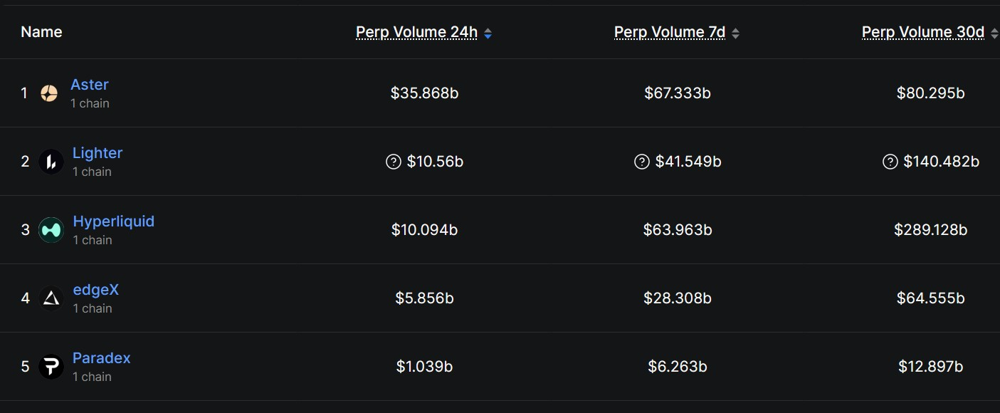
Image source: https://defillama.com/perps
DefiLlama data shows that, as of September 2025, Aster posted 24-hour trading volumes of approximately $35 billion, with Lighter and Hyperliquid each exceeding $10 billion, and edgeX at roughly $5.86 billion. These enormous volumes indicate that incentive programs on platforms like Aster have triggered substantial trading activity. Below, we break down the specifics of each project.
Overview of Launched Token Projects
- Hyperliquid (HYPE): A high-performance perpetuals platform built on its proprietary HyperCore chain and HyperEVM dual-layer architecture. GENESIS launch occurred on November 29, 2024, with a total supply of 1 billion HYPE: 31% (310 million) distributed instantly to early users, 38.888% reserved for future community rewards, 23.8% allocated to core team/contributors (vested and unlocked gradually from 2027–2028), and the remainder for the foundation and ecosystem grants. HYPE serves in both governance and staking, and is used to bootstrap white-label exchanges and other applications. Following launch, HYPE’s price jumped over tenfold (market cap grew from under $2 billion at the end of 2024 to over $12 billion by September 2025). Hyperliquid currently boasts 10,000–20,000 daily active users (about 600,000 total), supports 100+ trading pairs, and averages nearly $7 billion in daily trading volume. Innovations like self-hosted liquidity (Hyperliquidity) and Builder Core have attracted many experienced traders. Heavy users praise its low fees and full-chain transparency, though some cite a subpar mobile experience and high fiat on-ramp fees. Participation: Users who missed the initial airdrop can still earn future rewards by trading and staking liquidity (e.g., USDC) to accumulate points.
- Aster (Phases 2 & 3 ongoing): Aster’s token is live. Second-phase incentives are fully distributed, with the third “Dawn” phase underway; the token trades on major exchanges, boosting liquidity. Built on BNB Chain, Aster offers both simple and pro interfaces, up to 1001x leverage, and issues a yield-bearing stablecoin, USDF (stakeable as asUSDF). To earn rewards, users can deposit BNB/USDF, participate in the ALP multi-asset pool, trade perpetuals, and join official points contests; monitor official snapshots and claim rules to avoid missing out. Risk note: Intense incentives can temporarily inflate volumes; changes to rewards or rules may drive a pullback. Manage position sizes and account for trading/cross-chain costs accordingly.
- Drift Protocol (DRIFT): One of the first perpetual DEXs on Solana, DRIFT launched in 2023 (250 million total token supply; specific allocations not detailed). Key differentiator: interest-bearing collateral—margin earns interest, boosting capital efficiency. Airdrop and rewards have ended. Current participation is limited to staking, governance, and using Vault features for returns (APY ranges from 20%–50%). DRIFT’s market cap has dropped to lower levels amid volatility. Cautious, selective participation is advised, based on market and project developments.
- Avantis (AVNT): The largest derivatives DEX on Base, Avantis raised funds via public sale and launched its mainnet in February 2024. AVNT’s TGE occurred September 15, 2025, with subsequent listings on Coinbase, Binance, Upbit, etc., triggering sharp price appreciation. Total supply is 1 billion AVNT, of which 12.5% (125 million) were unlocked at launch as airdrops for active users, with the balance vested. Avantis employs a “zero-fee + profit-sharing” model: traders pay no open/close fees, but share profits with the platform; loss rebates and positive slippage incentives further align trader and LP interests. Supports 80+ markets (crypto, FX, commodities, indices) and up to 500x leverage; as of writing, Avantis has processed over $18 billion in trades, with more than 25,000 LPs and $23 million in TVL. Participation: Hold and stake AVNT to share in platform revenue (current staking yield ~23%) and join trading contests for additional rewards.
- Orderly Network (ORDER): A full-chain liquidity and trading infrastructure built on OP Stack and Celestia, leveraging a built-in order book. ORDER launched on August 26, 2025, with a 1 billion token supply: 55% (550 million) for community rewards (13.3% airdropped), 20% team/advisors, 15% strategic investors/early supporters, 10% for the foundation. All airdrops (92 million tokens, ~230,000 addresses) were unlocked at TGE. Orderly pioneered “Merits points competitions” for airdrop distribution; at peak in August, $15 million in daily income was paid out early to stakers. Orderly is already profitable: $80 billion+ in trading volume, $17.4 million in protocol revenue, $7.4 million net income; in August’s market crash, daily volume peaked at $1.8 billion, ranking among the top DEXs. The community views Orderly’s full-chain matching engine as a major advantage likely to attract long-term traders (DefiSquared: “market cap ~$25 million; huge potential, ORDER is undervalued”). Participation: The airdrop phase has ended; now, holders can stake ORDER for protocol revenue (60% of protocol income, current APY ~50%). Orderly supports six major chains (Ethereum, BSC, Polygon, Arbitrum, Optimism, Avalanche) and partners with 20+ market makers—watch for new DEX integrations in the ecosystem.
- Jupiter (JUP): The flagship DEX aggregator on Solana, JUP launched in January 2024 (10 billion total, split 50/50 community/team). Jupiter earns revenue via trading fees and allocates 50% to token buybacks. As of mid-2025, JUP has 3.1 billion tokens circulating (market cap ~$1.5 billion), with price dropping from a $2.04 high to ~$0.47. Jupiter continues to expand features: 100x leverage perpetuals, advanced limit orders, one-click strategies, with Jupiter Lend and a yield stablecoin in the pipeline. JUP is used for governance and, via staking, earns holders airdrops and Launchpad perks. With JUP’s airdrop complete, future opportunities lie in ecosystem participation (e.g., Jupiter Lend), not further points farming.
Top Projects Without Token Launches
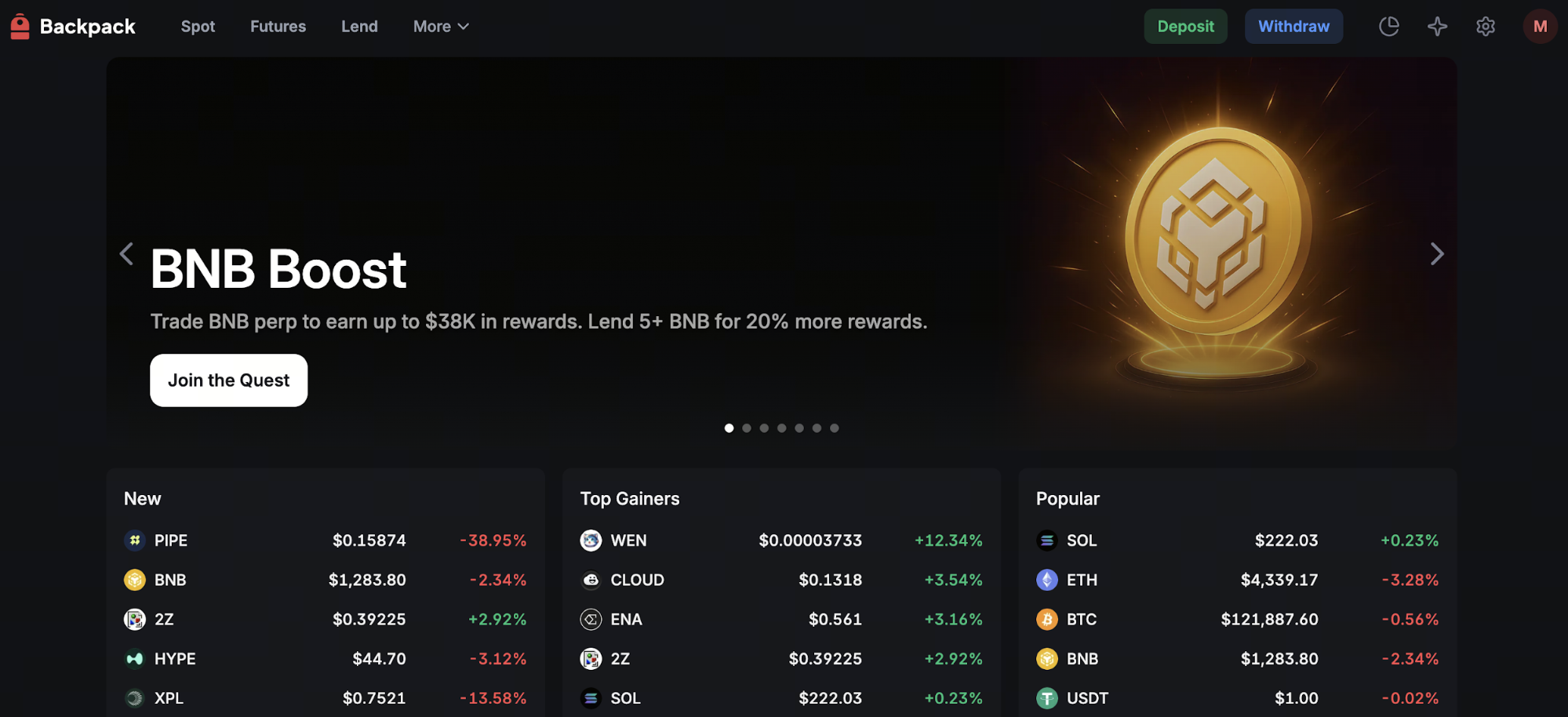
Official website: https://backpack.exchange/
Backpack (No Token Yet): A multi-chain trading platform (Solana, Ethereum, others) soon launching perpetuals. Backpack focuses on compliance and security, implementing KYC to meet regulatory needs; some processes echo centralized exchanges. Its rewards system lets users earn points for trading volume and deposits, with several points competition seasons completed. After season three, trading volume weightings increased, improving farming efficiency. Participation: Complete KYC and deposit (e.g., stake BNB, USDT) or trade to accumulate points. KYC is mandatory, so this suits users comfortable with identity verification. Tip: Safely accumulate points through small, regular interactions to prepare for any future token launch.
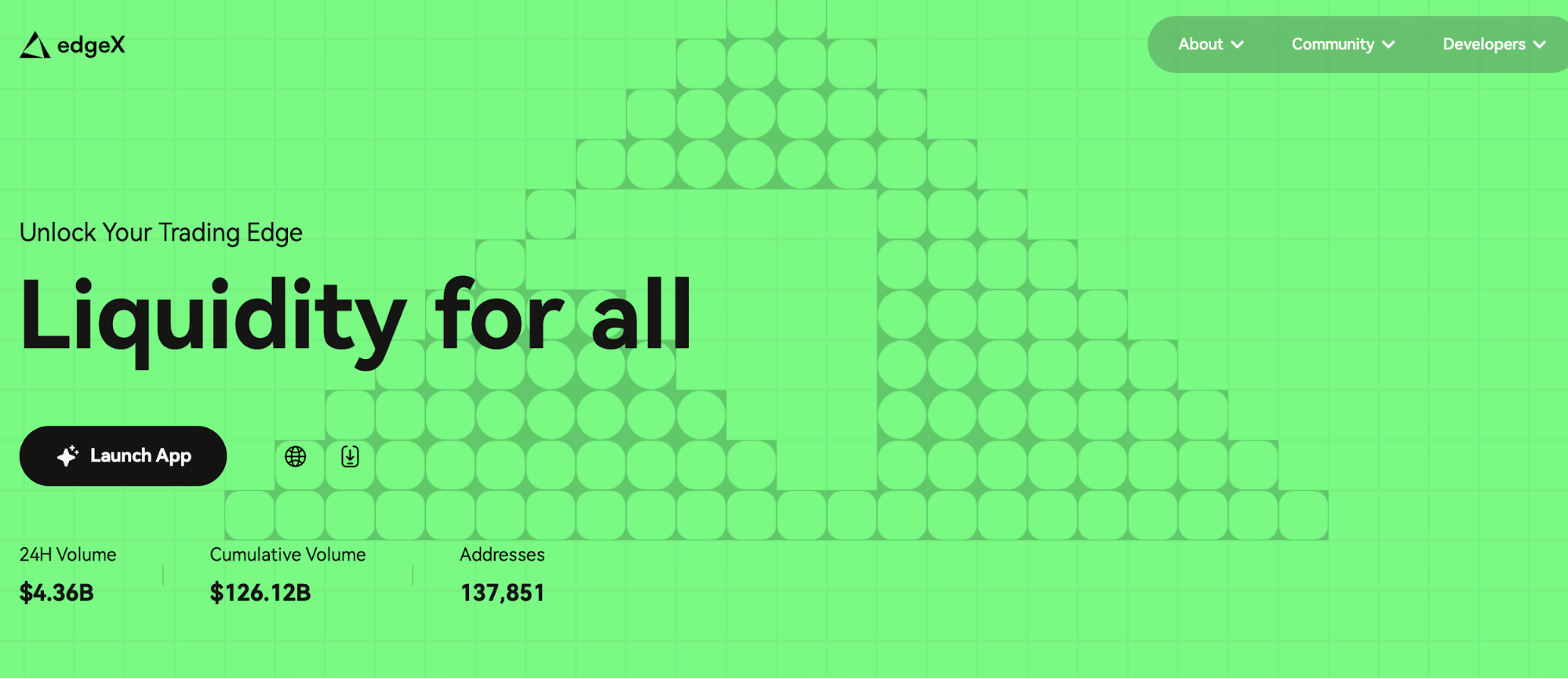
Official website: https://www.edgex.exchange/en
edgeX (No Token Yet): A multi-chain Perp DEX incubated by Amber Group, using StarkEx ZK-Rollup for speed and privacy. The UI mimics a centralized exchange, with integrated MPC wallets for a smoother user experience. Incentives are weekly: users’ trade volume and activity set their weekly point multipliers; only $10 is required to participate. Participation: Trade actively—each order earns points automatically. Amber’s backing draws community attention; track incentive cycles and join weekly events. The low entry barrier makes this attractive to retail users.
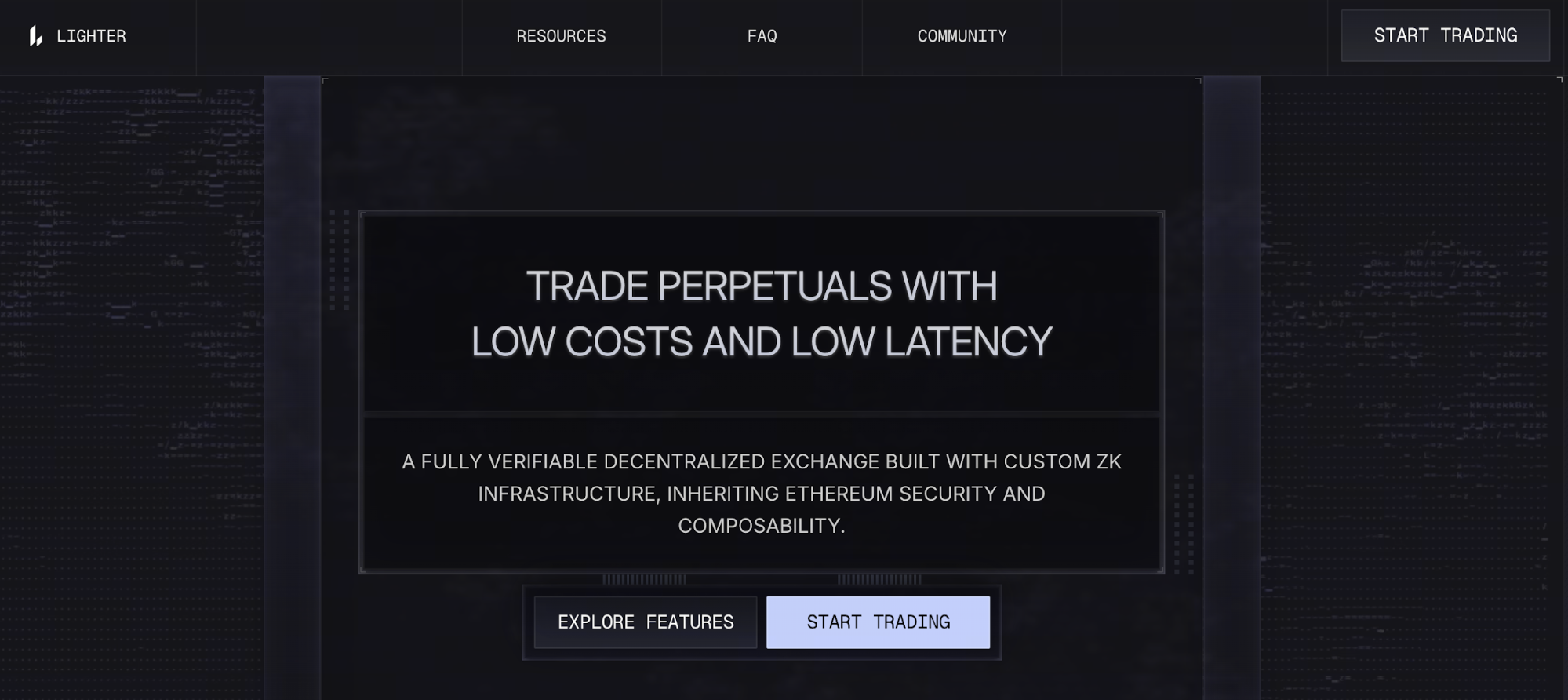
Official website: https://lighter.xyz/
Lighter (No Token Yet): An invite-only private testnet on Starknet L2 (EVM compatible), focusing on privacy and high-efficiency trading. Still in closed beta; token launch date not disclosed. Features include an open liquidity aggregation (LLP) pool with a ~63% APY; full yield requires unlocking via points. Participation: Secure an invite, join the beta, and trade to earn points—these will be tied to any future airdrop. Currently, access is limited to invitees or those joining via community channels. Tip: Seek testnet invites and trade in small amounts to accumulate points; monitor official announcements for openings or reward campaigns.
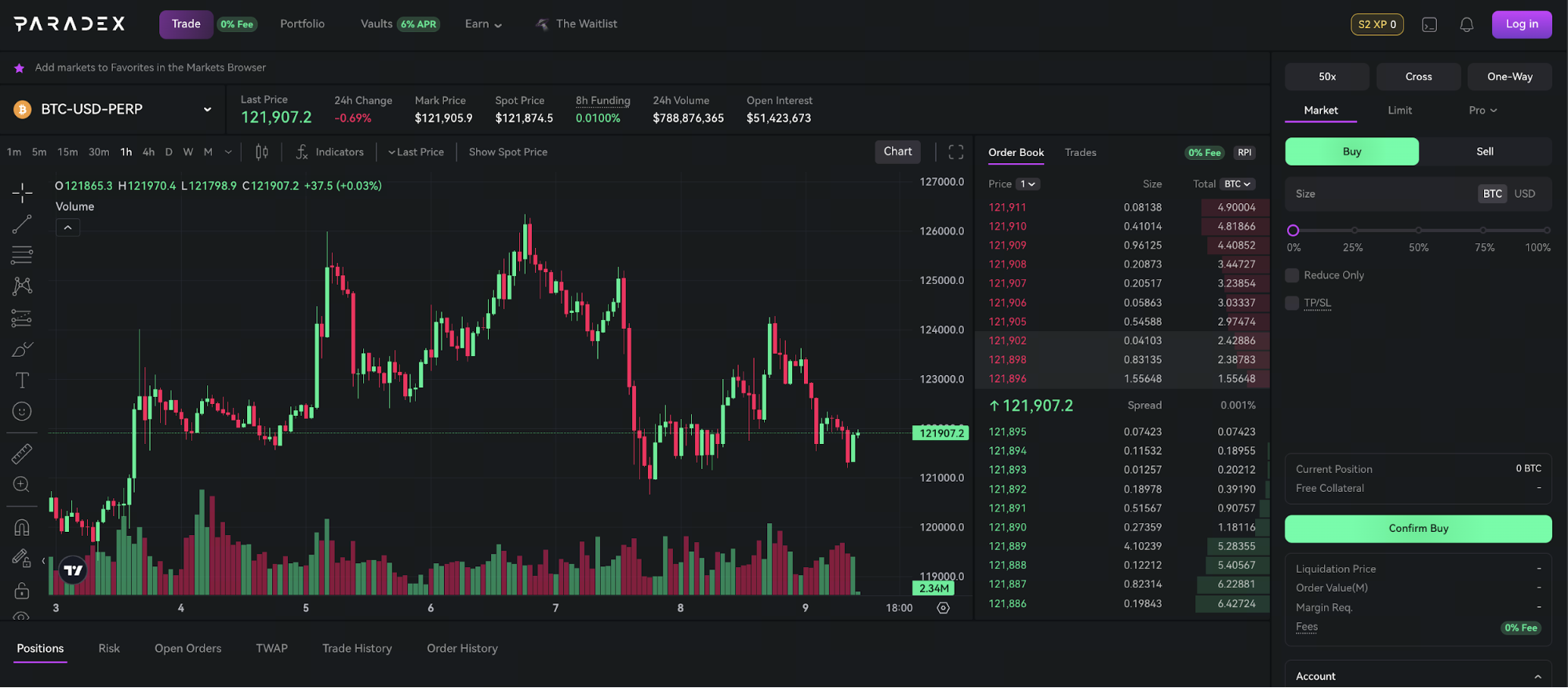
Official website: https://app.paradex.trade/trade/BTC-USD-PERP
Paradex (No Token Yet): The first StarkNet “Appchain,” incubated by Paradigm’s liquidity team and built on StarkNet Stack. Paradex aims for unified accounts integrating trading, perpetuals, and perpetual options, using zero trading fees to spur growth. Participation: Join quarterly “XP” events—holding, trading, and market making all yield points. Watch for the upcoming launch of Paradex’s full-featured DEX beta (“Plan”) for additional farming opportunities.
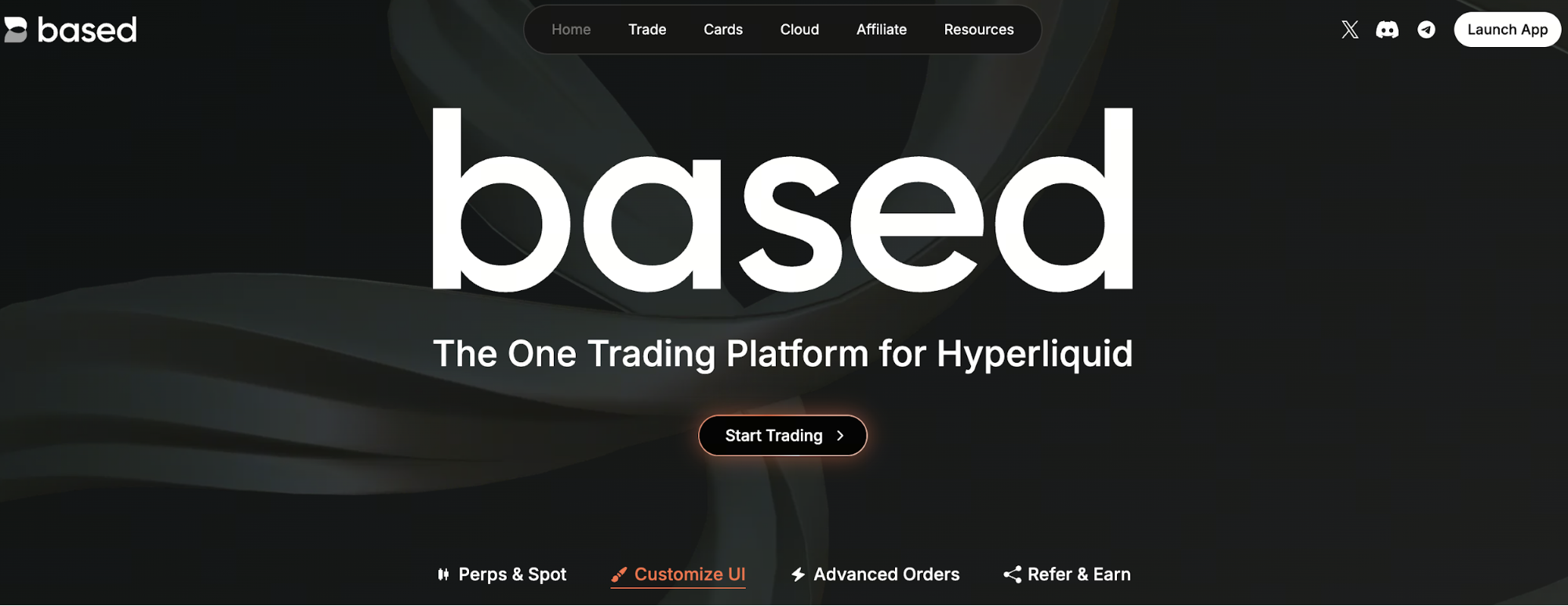
Official website: https://based.one/
BasedOneX (No Token Yet): Designed as the “channel trading platform” frontend for Hyperliquid, built by industry veterans. Functionally, it resembles a Hyperliquid frontend and dealership model, expanding access channels for Hyperliquid. Participation: Likely to reward activity through ecosystem trading competitions and community events; monitor official updates for opportunities.
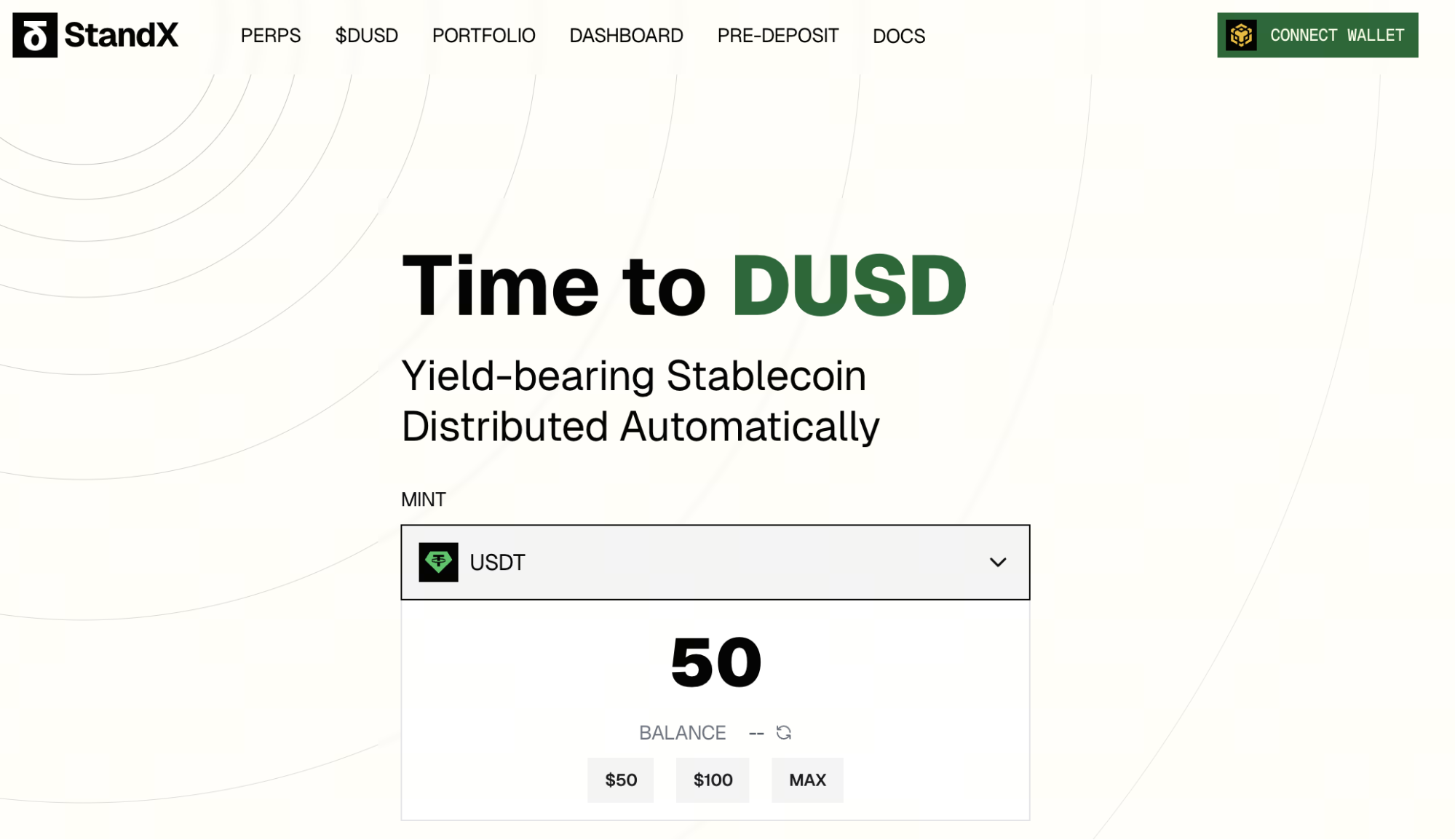
Image: https://standx.com/
StandX (No Token Yet): Created by former Binance Futures core engineers. Has launched DUSD, a yield-bearing stablecoin (trade mining), with mining integrated into trading. Perp DEX features are in beta; the platform is self-funded and not reliant on external investment. Participation: Currently, users can apply for the test list and join the beta; pre-deposit events may bring early rewards. Prepare funds in advance for testnet trading, earn points, and await future airdrops.
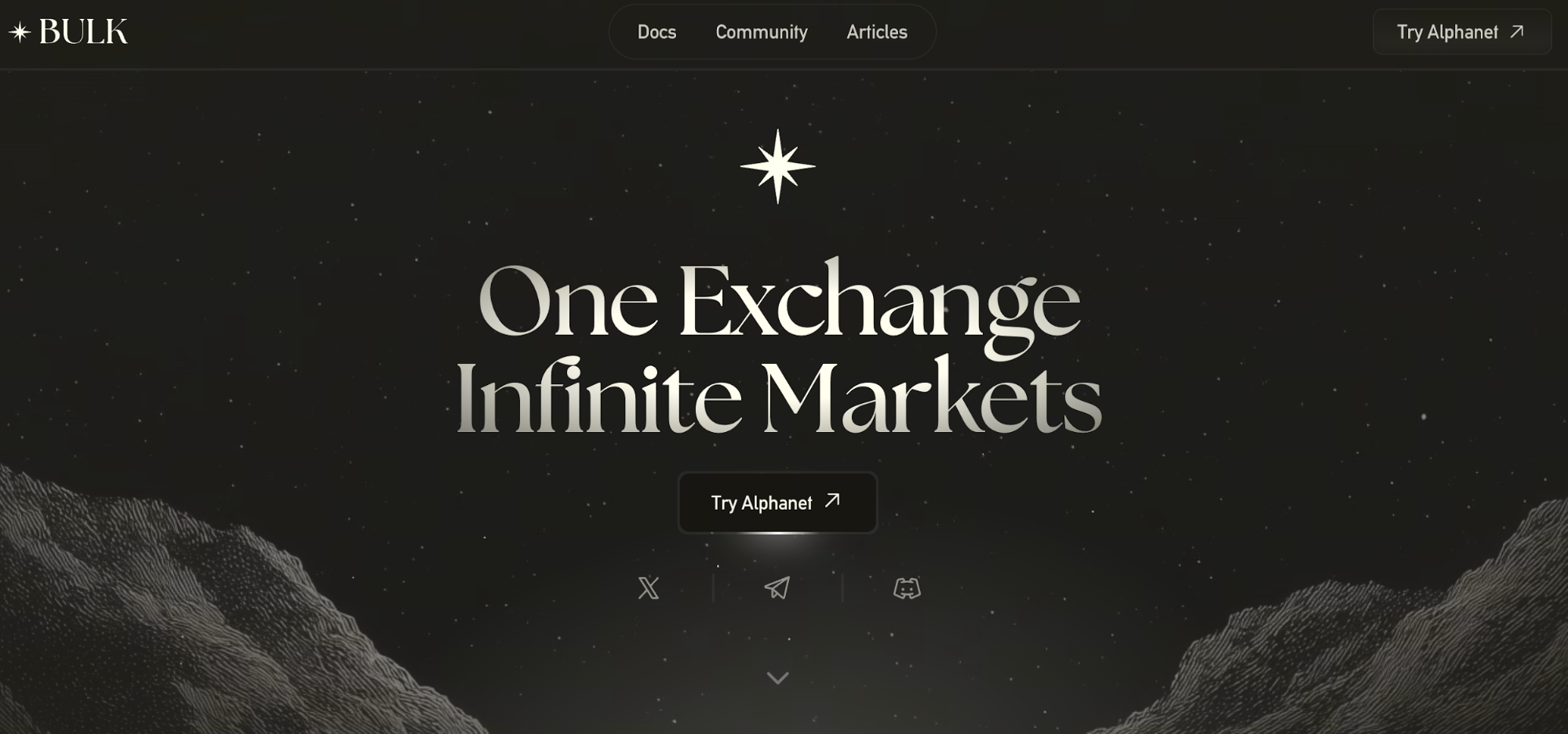
Official website: https://www.bulk.trade/
BulkTrade (Bulk, No Token Yet): A Solana-native perpetuals platform renowned for ultra-low latency matching. Its engine is embedded within Solana validator nodes (Bulk-Tile module), enabling order matching in 20 ms and confirmation in 40 ms. Participation: The mainnet is not live yet; monitor testnet status and participate in on-chain interactions. The innovative architecture is ideal for users interested in low-latency trading. Watch for official test activities and missions.
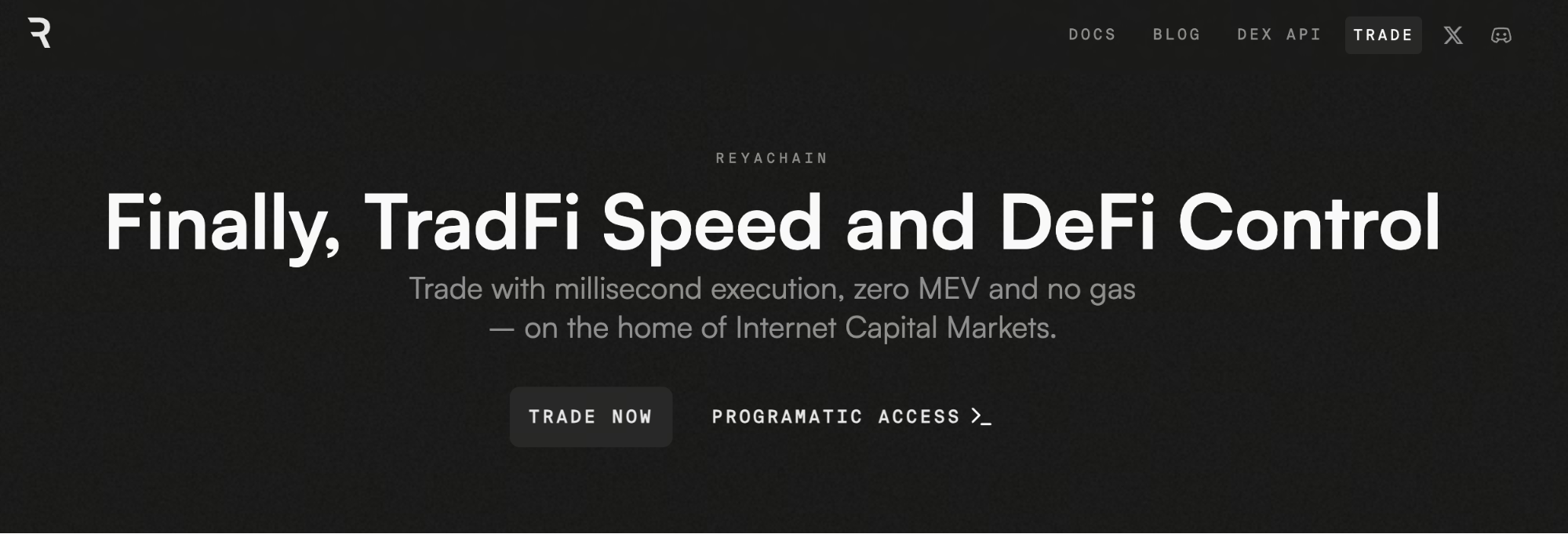
Official website: https://www.reya.network/
Reya Network (No Token Yet): A modular L2 focused on trading optimization, leveraging Arbitrum Orbit, and built as a dedicated DeFi trading chain. Reya features a global shared liquidity pool and cross-exchange margin accounts to deepen liquidity. Backed by Framework, Coinbase, Wintermute, and others, it has raised tens of millions of dollars. Participation: Reya operates a weekly points program based on trading volume and USDC staking. The team has held a liquidity generation event (LGE); deposit funds to accrue early points and watch for Reya Exchange’s launch to earn more. Tip: Participate in LGE and the exchange launch, trading or staking USDC to climb weekly leaderboards.
Project Capital and Ecosystem Alliances
Each project has a distinct backer and ecosystem profile. Binance-aligned projects (Aster, StandX) have deep resources; Amber Group (edgeX) is an Amber incubatee; Paradigm projects (Paradex) trace to the Paradigm team; Solana ecosystem (Jupiter, Drift, Bulk, Backpack, Lighter, etc.) projects cluster around Solana; Base ecosystem (Avantis) leads derivatives on Coinbase’s Base; Others like Hyperliquid are fully proprietary; Orderly is supported by OKX Ventures, Pantera, Longhui, Sequoia, and other top investors. The chart below details each project’s main alliances and notes:
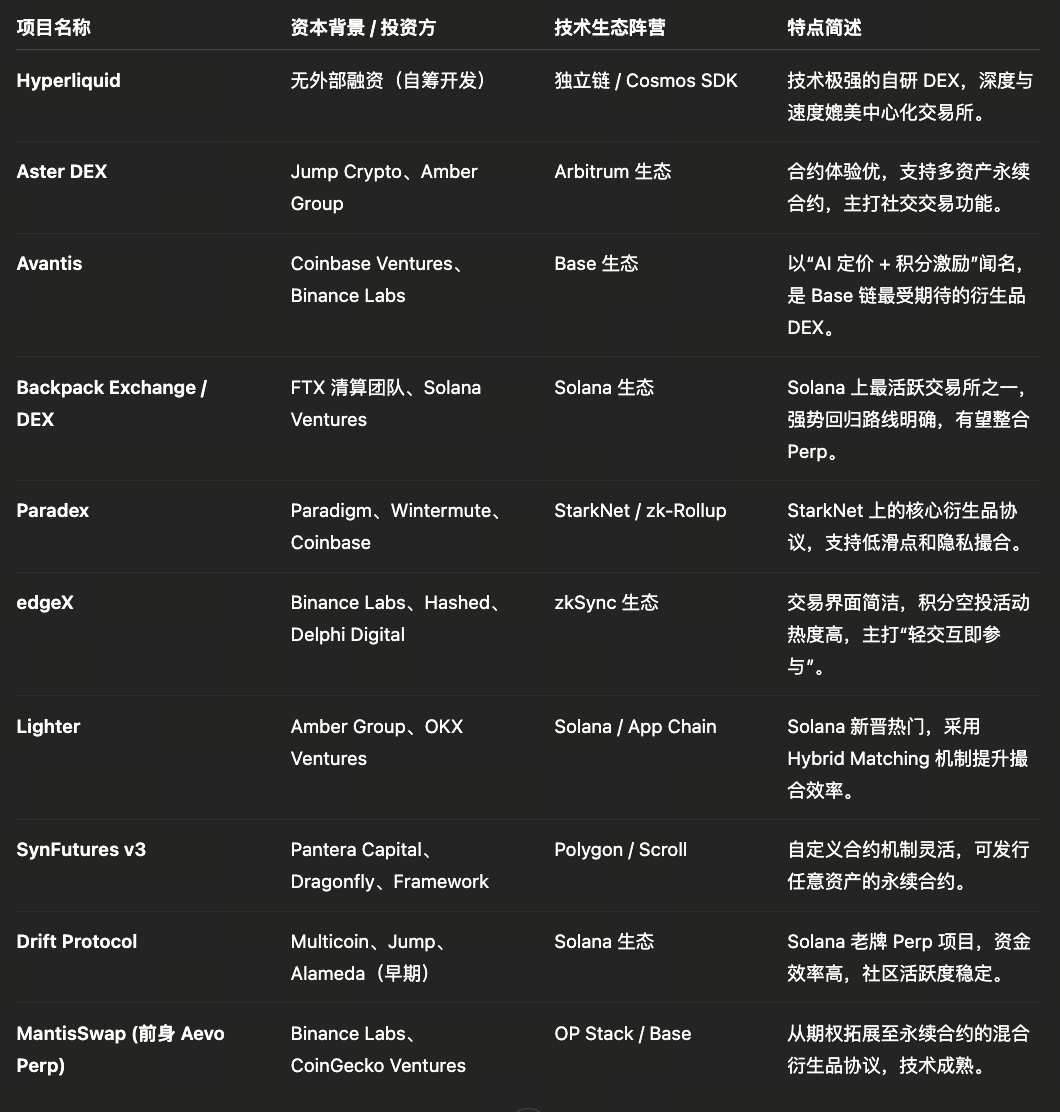
Participation Tiers & Interaction Strategies
Based on market momentum, token launch timelines, and other factors, these projects can be grouped into S+, S, and A tiers:
- S+ Tier (Top Hype, Strong Buy-In): Hyperliquid, Aster, Avantis, Backpack, edgeX, Lighter. These either have launched and rapidly claimed leading positions, or, despite being pre-launch, are top targets due to huge trading volumes and incentives. Recommendation: Prioritize registration, deposits, and trading with these; maximize points or staking. If capital is limited, allocate primarily here to qualify for airdrops and early rewards.
- S Tier (High Momentum, Good Potential): Paradex, Orderly, BasedOneX, StandX, Bulk, Reya. These are well-known and established, but a notch below S+. Strategy: Join community events (trading, staking), follow official news, and claim airdrops/rewards as instructed. For Orderly and Paradex (tokens live), consider staking for dividends; for others, monitor points competitions. Avoid overexposure—diversify with modest allocations.
- A Tier (Average Popularity, Higher Risk): Drift, Jupiter, and other new names. Drift and Jupiter are mature (tokens launched), best treated as standard investments—no need for heavy farming. For other early projects, consider small, experimental allocations. Focus: Manage exposure, avoid excessive farming, and prioritize risk control.
Interaction Guidelines
- Diversify Participation: Don’t focus on a single project; pick 2–3 S+ names for primary engagement, spreading the rest across S-tier projects.
- Task-Driven Engagement: Most projects reward “farming” (trading, deposits, market making). Follow official guides and Discords for rules and airdrop instructions.
- Staking and Holding: For live tokens, stake to earn dividends (HYPE, ORDER, etc.) or participate in governance; for pre-launch projects, check for staking-based points incentives (e.g., staking USDC).
- KYC and Entry Barriers: Some (e.g., Backpack) require identity verification—know requirements before joining. For high-barrier (large deposit or invite-only) projects, consider waiting or trialing with a small amount.
- On-Chain/Transaction Costs: Monitor gas fees for cross-chain transfers—Solana is low, Ethereum is high. Control transaction frequency to avoid excessive farming costs.
Future Trends & Risk Outlook
Token Launch Patterns: Most Perp DEXs now use an “airdrop + incentive season” model: launch with points competitions (XP seasons) to reward seed users and traders, then proceed to public TGE and exchange listings. Expect more phased airdrops and cross-chain launches going forward. Watch official channels and snapshot dates for updates. Track on-chain metrics (volume, user activity) to gauge project momentum and likely launch windows, and cross-reference with official and community news.
Community Participation Risks:
- Gas Costs: Heavy trading on Ethereum or Layer 2s can rack up substantial gas fees. Calculate carefully, and favor low-fee chains or rollups where possible.
- Time and Capital Requirements: Points competitions can last weeks or months, requiring ongoing effort. Some projects have high minimums (e.g., USDC deposits)—manage your assets wisely.
- Compliance Risks: While most Perp DEXs claim decentralization, some (Backpack, Aster) require KYC, exposing users to identity risk.
- Market Volatility: Points farming can artificially inflate volumes; when incentives end or token prices drop, traders may suffer losses. As the community notes, “these numbers don’t reflect true fundamentals.” Take profits opportunistically and avoid overcommitting.
Personal Participation Tips:
- Start Small: Use surplus funds and small amounts to farm points for possible future value. Avoid committing heavily to any single project.
- Stay Close to Official Channels: Join each project’s official community or X (Twitter) to get timely airdrop/task news. Use only official links and wallets to avoid missing eligibility.
- Monitor Staking and Returns: For live tokens (HYPE, ORDER, etc.), stake for dividends and track vesting; for pre-launch projects, look for stablecoin or LP staking for points or future tokens.
- Contract and Wallet Security: Only use official links and addresses. Beware of phishing contracts, especially when bridging assets between chains.
- Maintain Perspective: Airdrops are a “bonus,” not a core investment strategy. Take profits when available—don’t stubbornly hold losing positions.
In summary, the Perp DEX space is entering a true “airdrop season,” offering both opportunities and risks. All projects and suggestions here are for reference only—always exercise caution. Our aim is to help retail users navigate the landscape, engage efficiently, and maximize airdrop opportunities.
Note: All data current as of September 30, 2025.
Related Articles

The Future of Cross-Chain Bridges: Full-Chain Interoperability Becomes Inevitable, Liquidity Bridges Will Decline

Solana Need L2s And Appchains?

Top 10 NFT Data Platforms Overview

Sui: How are users leveraging its speed, security, & scalability?

7 Analysis Tools for Understanding NFTs
